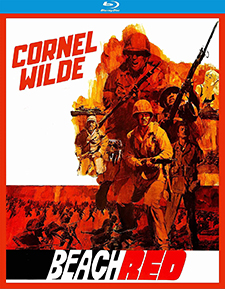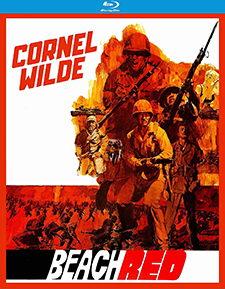Beach Red (Blu-ray Review)

Director
Cornel WildeRelease Date(s)
1967 (January 5, 2021)Studio(s)
Theodora Productions/United Artists/MGM (Kino Lorber Studio Classics)- Film/Program Grade: B
- Video Grade: A
- Audio Grade: A-
- Extras Grade: D
Review
Released at the height of the Vietnam War, Beach Red deals with American soldiers attempting to take a Japanese-held island during World War II. We see the men at various stages of the assault—on board the ship carrying them within miles of the target, the landing craft braving the waves as it approaches the island, the fighting on the beach, and the Americans’ gradual infiltration through tall grasses and eventually into the dense jungle.
The commander is Captain MacDonald (Cornel Wilde), a lawyer in private life and a leader respected by his men. He hates war but knows his duty and carries it out, often thinking back to his wife and family at home. In contrast, platoon leader Sgt. Honeywell (Rip Torn) is driven to fight and kill to win any way he can, moral or not.
Wilde, who also produced and directed, is the nominal star but doesn’t dominate screen time. He has the camera focus on a small group of men from varying backgrounds. Private Colombo (Jaime Sanchez) is concerned primarily with his own safety yet dreams of winning medals. Private Cliff (Patrick Wolfe) is a 19-year-old minister’s son who wants to return to college and become a lawyer. Private Egan (Burr DeBenning) is an uneducated Southerner who feels the military offers him a better life than he had at home. Cliff and Egan bond during a mission, sharing thoughts of their girls at home, the uncertainty of war, and Cliff’s puzzlement at why God would allow a war in which so many innocent men are being killed.
The film has an often poetic feel through characters’ inner monologues, flashbacks (in both still photos and film montage), and pauses between action sequences. Wilde shows the conflict from both the American and Japanese points of view. The opening credits feature paintings of both war scenes and tranquil scenes of Japanese home life. The title song, sung under the credits, is a somber, wistful ballad that suggests a quiet, introspective rumination on war.
But once the credits are over, we’re aboard ship with hundreds of soldiers waiting to attack. The tone shifts as the men advance. The first twenty minutes or so show intense battle scenes. The Americans are under heavy fire and explosions pepper the beach. Men are killed and dismembered body parts litter the sand. Soldiers crawl on their bellies to avoid machine gun fire. A soldier—his arm blown off—walks in dazed shock before dying.
When the scene shifts to the Japanese soldiers, they speak in Japanese. There are no translations but we have no difficulty following the action. This enhances credibility. Director Wilde shows the cruelty of the Japanese officers to their own men and elicits sympathy for them by showing their thoughts, which are very similar to those of the Americans. They long for home, family, and the life they left behind. Wilde portrays them as men, not monsters. Clint Eastwood would explore the Japanese point of view in more detail nearly thirty years later in Letters from Iwo Jima.
Characterization is inconsistent. Cliff and Egan are the best developed. Cornel Wilde’s Captain MacDonald is a stereotype of the noble leader. Since Wilde is the only name actor in the cast, it may seem surprising that his role is not more fleshed out and he’s not on screen more, but then he was doing triple duty as producer/director/star. Honeywell is memorable because of Rip Torn’s vivid portrayal, but we learn little about what has made the platoon sergeant so hardened and lacking a moral compass. Colombo is interesting up to a point, but the film never explores his conflicted feelings about war as he wavers between self-concern and dreams of glory.
Featuring 1080p resolution, the Blu-ray release of Beach Red from Kino Lorber Studio Classics is presented in the widescreen aspect ratio of 1.85:1. Picture quality varies. Stock footage of large ships bombarding the island, explosions, and hundreds of landing craft is grainy with white vertical scratches. Interspersed with the newer footage, this difference is quite noticeable. Director Wilde likely felt the footage would add production value when the budget wouldn’t permit the expense and logistics to recreate these images. The new footage looks great, with details prominent. Blades of grass, insignia on uniforms, camouflage patterns on helmets, banyan tree roots, dirt and sweat on the men’s faces, and the veins on huge jungle leaves are sharp. An interesting touch is the last painting shown under the credits blending into a live-action close-up of Sgt. Honeywell shouting an order to his men.
The soundtrack is English 2.0 Mono DTS-High Definition Master Audio. Optional English SDH subtitles are available. Dialogue is sharp throughout. The assault on the island features explosions, machine gun and rifle fire, huge splashes of water as mortar fire hits, men’s utterances as they are shot, and the sound of men crawling through sand. Silence is used dramatically when the men are in the jungle and visibility is impaired by thick jungle growth. The enemy can be anywhere and everywhere. The title song is sung by Jean Wallace, who infuses it with a plaintive, melancholy quality that contrasts sharply with the action that opens the film. Gunfire dominates, especially the relentless rat-tat-tat of a Japanese machine gun that pins the soldiers down once they’ve hit the beach. In hand-to-hand combat scenes, grunts suggest the physical energy expended by men on both sides. Japanese is spoken when scenes feature Japanese officers and enlisted men.
Bonus features include several theatrical trailers: Beach Red, Wake Island, Fixed Bayonets!, Beachhead, Attack!, Time Limit, Run Silent, Run Deep, The Secret Invasion, The Train, and Ambush Bay.
Later films, such as The Thin Red Line and Saving Private Ryan, have dealt with soldiers in often gripping ways, but Beach Red was the first to portray men in war as diverse human beings with both noble and flawed instincts. Not every American soldier is portrayed as heroic and not every Japanese soldier is a one-dimensional villain. These are men called up to fight for their country, getting through the horrors of battle by clinging to thoughts of home. The film leaves a sweeping, haunting impression.
- Dennis Seuling

